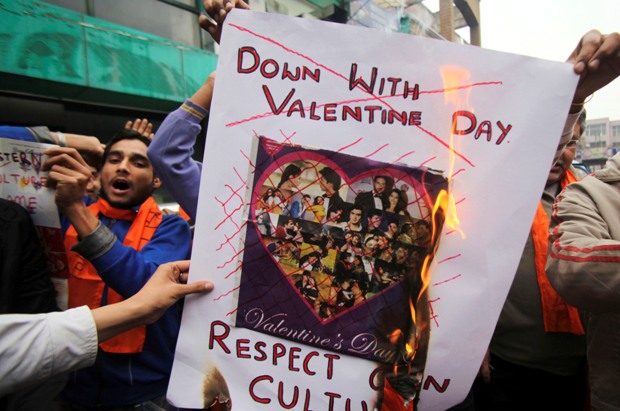
It’s commonly associated with expressions of love and affection, particularly romantic love.
People often exchange gifts such as chocolates, flowers, and cards, with their loved ones on this day.
It has its origins in both Christian and ancient Roman traditions, but today it is celebrated in many countries around the world, often with various customs and traditions.
It is usually the Day every celebrant is identified by the dominant colour red – a typical symbol of love.
However in some countries, PUNCH Online notes that the celebration of Valentine’s Day conflicts with traditional customs or religious beliefs.
For example, in some Islamic countries, there are concerns that Valentine’s Day promotes Western values and may contradict Islamic teachings.
In some countries, there may be historical or political factors at play. For instance, in countries with authoritarian governments, the celebration of Valentine’s Day might be restricted or discouraged as it is seen as a symbol of Western influence.
Also, in regions facing social or economic challenges, the focus may be on more pressing issues rather than on celebrating a romantic holiday.
Additionally, the commercialisation of Valentine’s Day can be seen as excessive or inappropriate in certain cultures or communities.
Some individuals simply may not find Valentine’s Day relevant to their lives or may not prioritize celebrating romantic relationships in this particular way.
Cultural attitudes toward love and relationships vary widely, and not everyone feels compelled to participate in Valentine’s Day festivities.
Overall, the reasons for not celebrating Valentine’s Day can be complex and multifaceted, influenced by cultural, religious, historical, and personal factors.
Find the list of 10 countries where Valentine’s Day is not widely celebrated:
- Saudi Arabia: Due to religious and cultural reasons, public celebration of Valentine’s Day is prohibited.
- Pakistan: Although some individuals may privately celebrate, it’s not widely observed due to cultural and religious sensitivities.
- Iran: The celebration of Valentine’s Day is discouraged by the government and is considered a Western cultural influence.
- Indonesia: While Valentine’s Day is celebrated by some, it has faced restrictions in recent years due to cultural and religious concerns.
- Malaysia: While not illegal, the celebration of Valentine’s Day is discouraged by some Islamic authorities.
- Brunei: Public celebrations of Valentine’s Day are not permitted as they are seen as contrary to Islamic values.
- Qatar: Public celebrations of Valentine’s Day are not common due to cultural and religious reasons.
- Somalia: The celebration of Valentine’s Day is not a widespread practice due to cultural and religious beliefs.
- Afghanistan: Valentine’s Day is not widely celebrated due to ongoing security concerns and conservative cultural norms.
- Mauritania: Public observance of Valentine’s Day is rare due to cultural and religious considerations.
These countries often have cultural or religious reasons for not embracing Valentine’s Day in the same way as other parts of the world.













